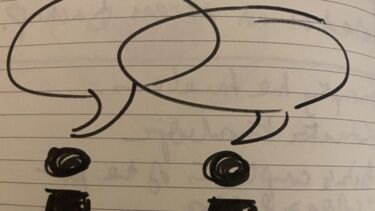Disability Dialogues
A series of short provocative pieces on disability

Disability Dialogues is a joint initiative organised by iHuman, University of Sheffield; Centre for Disability Studies; University of Leeds; Disability Innovation Institute, University of New South Wales; OISE, University of Toronto, and National Institute of Education, Nanyang Technological University Singapore.
Read the contributions here.
What are Disability Dialogues?
As a community of critical disability studies researchers and scholars we are committed to promoting disability conversations and debates. The question about how we do disability studies is an interesting one because it raises queries about how we work collectively as a community to address debate, disagreement and discourse. We are reminded of the words of the late great Mairian Corker’s (2000) call for a dialogical disability studies. She writes ‘when perceived in dialogic terms, the disciplinarity of disability studies becomes a conversation about difference through sameness: a localisation of the parts, joined through strategic interpenetration and interdependence, and supporting the unity of the abstraction we call disability’ (Corker, 2000: 304). Hence, while we come together under the wide disciplinary framing of disability studies - or critical disability studies - our sameness also exposes our differences; especially when we engage with one another’s different perspectives, experiences and aspirations.
Our differences might reflect disciplinary backgrounds, political affiliations, gender identity and socio-economic status, disability identities and intersectional positionalities. Our different perspectives create moments of tension and friction. We are committed to sharing contrasting perspectives as part of a wider commitment to promoting anti-ableist practice in the university, in research and in science.
Dialogue isn’t always easy, though dialogue is always revealing. A dialogical disability studies promotes respect, ethics and recognition of one another. We will reveal forms of inequity and injustice in our dialogues; because this contrasts with the culture of silence and politeness promoted by colleagues who want to keep the ableist status quo within universities. Finding anti-ableist practice will dig out further challenges, barriers, difficulties and emotions: not least because ableism is layered with other forms of oppression associated with sexuality, gender, age, race, ethnicity and social class. And it is within the midst of difficult conversations - tricky disability dialogues - that we will find forms of strategic interpenetration (where shared theories and practices align) and interdependent relations (where we build our communities together). Some of the questions we might think of addressing:
- How do different forms of disability activism challenge mainstream understandings of anti-ableism (e.g. neuroqueering, self-advocacy of people with learning disabilities, crip articulations of failure)?
- Who do we imagine to be participating in our university communities; who is missing and who is present?
- How might we properly engage with intersectional identities and practices?
- What does access mean in theory and in practice?
- In what ways do academics respect and collaborate with professional services colleagues in ways that contribute to anti-ableist practice?
- In what ways do academics respect and collaborate with partners outside the university in ways that contribute to anti-ableist practice?
- How do we share and collaborate in our findings with audiences beyond the university?
- How might we articulate and mediate access frictions with one another?
As we reflect on the recent passing of another disability studies pioneer, Anita Ghai, it is worth sitting with five Ghaisms (Ghai, 2024):
Ghaism 1: Disability can only ever be understood in relation to place, culture and history. A point we should remind those folk, especially white folk in the global north, who often seek to find a ‘universal model’ of disability.
Ghaism 2: Disability is as much a psychical matter as it is a political one. Do not be afraid to consider the psychological, the psychical, the emotional, the affective - just ensure that it is wrapped in criticality and a socio-cultural persuasion.
Ghaism 3: Disability theorisation can only ever be done in unison with disability politics and disability culture. It is impossible to divorce these communities from one another; no matter how much academia might like to do.
Ghaism 4: Disability is a fundamentally intersectional entity. Anita Ghai always knew this, drawing attention to this and pushed us all to not fall for simplistic one-dimensional understandings of disability.
Ghaism 5: The disability experience is truly a complex material and immaterial one. Anita, you have always been as interested in materiality as you immateriality and your writing has never sought to separate them. Anita, thank you for all you have done and continue to do for the field of critical disability studies.
Our disability dialogues builds on the legacy of writers like Corker and Ghai who encouraged disability studies researchers to debate and disagree in a spirit of generosity and criticality.
References
Corker, M. (2000). A View from the Bridge: An lnterdisciplinarian's Overview of the Social Relations of Disability Studies. Disability Studies Quarterly, 19 (4), 302-310.
Ghai, A. (2002). Disabled women: An excluded agenda for Indian feminism. Hypatia: A Journal of Feminist Philosophy, 17 (3), 49–66.
Ghai, A. (2006). (Dis)embodied Form: Issues of Disabled Women. Delhi: Shakti Books.
Ghai, A. (2014). Rethinking Disability in India. Delhi: Routledge.
Ghai, A. (2024). The 2024 iHuman Annual Critical Disability Studies Lecture. https://www.sheffield.ac.uk/ihuman/disability-matters/2024-ihuman-annual-lecture

iHuman
How we understand being ‘human’ differs between disciplines and has changed radically over time. We are living in an age marked by rapid growth in knowledge about the human body and brain, and new technologies with the potential to change them.
